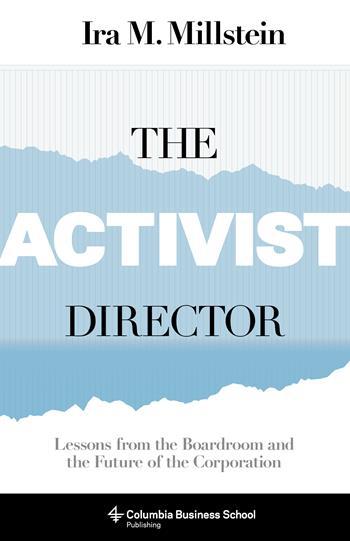autres publications Nouvelles diverses Valeur actionnariale vs. sociétale
Socially Responsible Firms : une RSE non antinomique à la maximisation des profits
Ivan Tchotourian 20 janvier 2017
Bonjour à toutes et à tous, c’est un beau papier que proposé sur SSRN et au titre accrocheur « Socially Responsible Firms » (Ferrell, Allen and Liang, Hao and Renneboog, Luc, Socially Responsible Firms (August 2016). European Corporate Governance Institute (ECGI) – Finance Working Paper No. 432/2014). Principale enseignement de cette étude : la problématique de la responsabilité sociétale ne serait pas antinomique avec la primauté de la valeur actionnariale.
The desirability for corporations to engage in socially responsible behavior has long been hotly debated among economists, lawyers, and business experts. Back in the 1930s, two American lawyers, Adolf A. Berle, Jr., and E. Merrick Dodd, Jr., had a famous public debate addressing the question: to whom are corporations accountable? Berle argued that the management of a corporation should be held accountable only to shareholders for their actions, and Dodd argued that corporations were accountable to both the society in which they operated and their shareholders. The lasting interest in this debate reflects the fact that the issues it raises touch on the basic role and function of corporations in a capitalist society.
(…) In our paper, ‘Socially Responsible Firms’, we take a comprehensive look at the CSR agency and good governance views around the globe. By means of a rich and partly proprietary CSR data set with global coverage across a large number of countries and composed of thousands of the largest companies, we test these two views by examining whether traditional corporate finance proxies for firm agency problems, such as capital spending cash flows, managerial compensation arrangements, ownership structures, and country-level investor protection laws, account for firms’ CSR activities. While other studies using a within-country quasi-experimental approach focus on the marginal effect of variation in agency problems, our data and empirical setting enable us to examine its average effect. Based on this comprehensive analysis, we fail to find evidence that CSR conduct in general is a function of firm agency problems. Instead, consistent with the good governance view, well-governed firms, as represented by lower cash hoarding and capital spending, higher payout and leverage ratio, and stronger pay-for-performance, are more likely to be socially responsible and have higher CSR ratings. In addition, CSR is higher in countries with better legal protection of shareholder rights and in firms with smaller excess voting power held by controlling shareholders. Moreover, a higher CSR rating moderates the negative association between a firm’s managerial entrenchment and value. All these findings lend support to the good governance view and suggest that CSR in general is not inconsistent with shareholder wealth maximization.
À la prochaine…
Ivan Tchotourian
autres publications Nouvelles diverses
The Anatomy of Corporate Law : nouvelle édition
Ivan Tchotourian 16 janvier 2017
Voici une bible dont la 3e édition vient d’être publiée : « The Analtomy of Corporate Law » (Oxford University Press). Si vous ne l’avez pas encore dans votre bibliothèque, c’est le moment de l’acheter ! C’est un incontournable pour qui s’intéresse à la gouvernance d’entreprise dans une perspective comparative.
This is the long-awaited third edition of this highly regarded comparative overview of corporate law. This edition has been comprehensively revised and updated to reflect the profound changes in corporate law and governance practices that have taken place since the previous edition. These include numerous regulatory changes following the financial crisis of 2007-09 and the changing landscape of governance, especially in the US, with the ever more central role of institutional investors as (active) owners of corporations. The geographic scope of the coverage has been broadened to include an important emerging economy, Brazil. In addition, the book now incorporates analysis of the burgeoning use of corporate law to protect the interests of « external constituencies » without any contractual relationship to a company, in an attempt to tackle broader social and economic problems.
The authors start from the premise that corporations (or companies) in all jurisdictions share the same key legal attributes: legal personality, limited liability, delegated management, transferable shares, and investor ownership. Businesses using the corporate form give rise to three basic types of agency problems: those between managers and shareholders as a class; controlling shareholders and minority shareholders; and shareholders as a class and other corporate constituencies, such as corporate creditors and employees. After identifying the common set of legal strategies used to address these agency problems and discussing their interaction with enforcement institutions, The Anatomy of Corporate Law illustrates how a number of core jurisdictions around the world deploy such strategies. In so doing, the book highlights the many commonalities across jurisdictions and reflects on the reasons why they may differ on specific issues.
The analysis covers the basic governance structure of the corporation, including the powers of the board of directors and the shareholder meeting, both when management and when a dominant shareholder is in control. It then analyses the role of corporate law in shaping labor relationships, protection of external stakeholders, relationships with creditors, related-party transactions, fundamental corporate actions such as mergers and charter amendments, takeovers, and the regulation of capital markets.
À la prochaine…
Ivan Tchotourian
autres publications engagement et activisme actionnarial Gouvernance normes de droit Nouvelles diverses
Hedge fund et activisme : un ouvrage
Ivan Tchotourian 10 janvier 2017
Bonjour à toutes et à tous, je signale cet ouvrage de John C Coffee Jr et Darius Palia sur l’activisme des fonds de couverture : « The Wolf at the Door: The Impact of Hedge Fund Activism on Corporate Governance ». Un bel ouvrage pour compléter une bibliothèque.
The Wolf at the Door: The Impact of Hedge Fund Activism on Corporate Governance has three basic aims: (1) to understand and explain the factors that have caused the recent explosion in hedge fund activism; (2) to examine the impact of this activism, including whether it is shortening investment horizons and discouraging investment in research and development; and (3) to survey and evaluate possible legal interventions with an emphasis on the least restrictive alternative. Although there have been other lengthy surveys, the landscape of activism is rapidly changing and this brings into doubt the relevance of empirical papers that study hedge fund activism in earlier decades. The authors suspect that the recent success of such activism may be fueling a current « hedge fund bubble » under which an increasing number of activist funds are pursuing a decreasing, or at least static, number of companies that have overinvested. This monograph is particularly focused on those markets and the legal forces that may be driving this bubble. After an introduction, Section 2 begins with an analysis of those factors that have spurred greater activism on the part of hedge funds. Section 3 considers evidence suggesting that as the composition of a firm’s shareholder population shift towards more « transient » holders, its investment horizon shortens. Section 4 surveys recent studies to reach assessments about who the targets of hedge fund activism are; the stock price returns from hedge fund activism and the distribution of those returns; the degree to which wealth transfers explain the positive stock price returns to activism; the post-intervention evidence about changes in operating performance of hedge fund targets; and the holding periods and exit strategies of hedge fund activists. Section 5 evaluates some policy options looking for the least drastic means of accomplishing policy goals. Finally, Section 6 offers a brief conclusion that surveys how the changing structure of shareholder ownership and the recent appearance of temporary shareholder majorities complicate corporate governance, both empirically and normatively.
À la prochaine…
Ivan Tchotourian
autres publications Gouvernance mission et composition du conseil d'administration Nouvelles diverses
Administrateur activiste : le dernier ouvrage de Millstein
Ivan Tchotourian 2 janvier 2017
En cette période de fêtes qui se termine, pourquoi ne pas vous offrir le dernier ouvrage d’Ira M. Millstein sur la gouvernance d’entreprise ? Intitulé « The Activist Director: Lessons from the Boardroom and the Future of the Corporation » (Columbia University Press, décembre 2016), je ne peux que vous le recommander. Pour ma part, il est commandé, je n’attends plus que de le recevoir !
Voici le résumé :
Some of the worst corporate meltdowns over the past sixty years can be traced to passive directors who favored operational shortcuts over quality growth strategies. Thinking primarily about placating institutional investors, selective stockholders, proxy advisors, and corporate management, these inattentive and deferential board members have relied on short-term share price increases to sustain their companies long term. Driven by a desire for prosperity, not posterity, these actions can doom any company.
In The Activist Director, attorney Ira M. Millstein looks back at fifty years of counseling companies, nonprofits, and governments to actively govern their corporations and constituencies. From the threat of bankruptcy and the ConEd blackout of 1970s New York City, to the meltdown of Drexel Burnham Lambert in the late 1980s, to the turnaround of General Motors in the mid-1990s, Millstein takes readers into the boardrooms of several of the greatest catastrophes and success stories of America’s best-known corporations.
His solution lies at the top: a new breed of activist directors who partner with management and reject short-term outlooks, plan a future based on growth and innovation, and take responsibility for corporate organization, strategy, and efficiency. What questions should we ask of potential board members and how do we know they’ll be active? Millstein offers pragmatic suggestions for recruiting activist directors to the boardroom to secure the future of the corporation.
Pour en savoir plus sur ce livre, cliquez ici.
À la prochaine…
Ivan Tchotourian
autres publications Base documentaire doctrine normes de droit Nouvelles diverses
Pourquoi vous incorporer au Québec ?
Ivan Tchotourian 16 décembre 2016
« Avez-vous pensé à vous incorporer? » (Blogue Contact, 15 décembre 2016) est mon dernier billet du blogue Contact de l’Université Laval. Vous pourrez découvrir le pourquoi je conseille aux entrepreneurs de penser à s’incorporer, bien entendu tout dépendant de ce qu’ils veulent faire et de tout un ensemble de facteurs…
Il est excitant de créer son entreprise et de se lancer en affaires. L’aventure comporte cependant de nombreux défis, dont le choix entre une multitude de statuts juridiques possibles: entreprise individuelle, société de personnes, coopérative, société en commandite, société en nom collectif, fiducie, société par actions, personnes morales… Ce billet jette un éclairage sur une forme particulière d’entreprise à but lucratif: la société par actions. Anciennement dénommée «compagnie» ou «corporation», la société par actions fait l’objet de croyances populaires que je compte ici démythifier, en plus de démontrer ses avantages pour toute entreprise en démarrage cherchant un gain pécuniaire. Bref, les entrepreneurs devraient penser à s’incorporer, et ce, relativement rapidement.
À la prochaine…
Ivan Tchotourian
autres publications Nouvelles diverses
Discours de l’Union : la RSE en bout de ligne !
Ivan Tchotourian 2 novembre 2016
Le Bulletin de droit économique vient de publier mon dernier article (rédigé avec Jean-Christophe Bernier) se veut une synthèse et une mise en perspective du discours de l’État de l’Union de Barack Obama : « Investir dans un autre futur : Un ambitieux discours sur l’État de l’Union ».
Au début de l’année, le président Américain Barak Obama a prononcé son discours sur l’État de l’Union, moment fort de la vie politique en nord-Amérique. Si ce dernier y a abordé de nombreuses questions, nous nous intéressons dans le cadre de cet article à deux thématiques qui font l’objet d’une grande actualité : la gouvernance d’entreprise et l’environnement. L’objectif est de présenter les grands axes qui se dégagent du discours en les mettant en perspective avec la plus récente actualité juridique.
Pour en savoir plus, cliquez ici.
À la prochaine…
Ivan Tchotourian
autres publications Nouvelles diverses
Risques environnementaux : comment les gérer ?
Ivan Tchotourian 28 octobre 2016
Le Journal des sociétés (excellente revue, pleine d’informations) de mars 2016 propose un dossier intitulé : « La gestion des risques environnementaux par les entreprises ». Nul doute que ce dossier spécial attirera plusieurs de vous !
Au programme de ce dossier, les articles suivants :
- L’attribution du risque environnemental en matière de vente
- La loi ALUR : les dispositions sur la reconversion des friches industrielles
- La responsabilité des propriétaires de sols pollués : une grande insécurité juridique
- Cession d’entreprise et garantie du passif environnementale
À la prochaine…
Ivan Tchotourian





